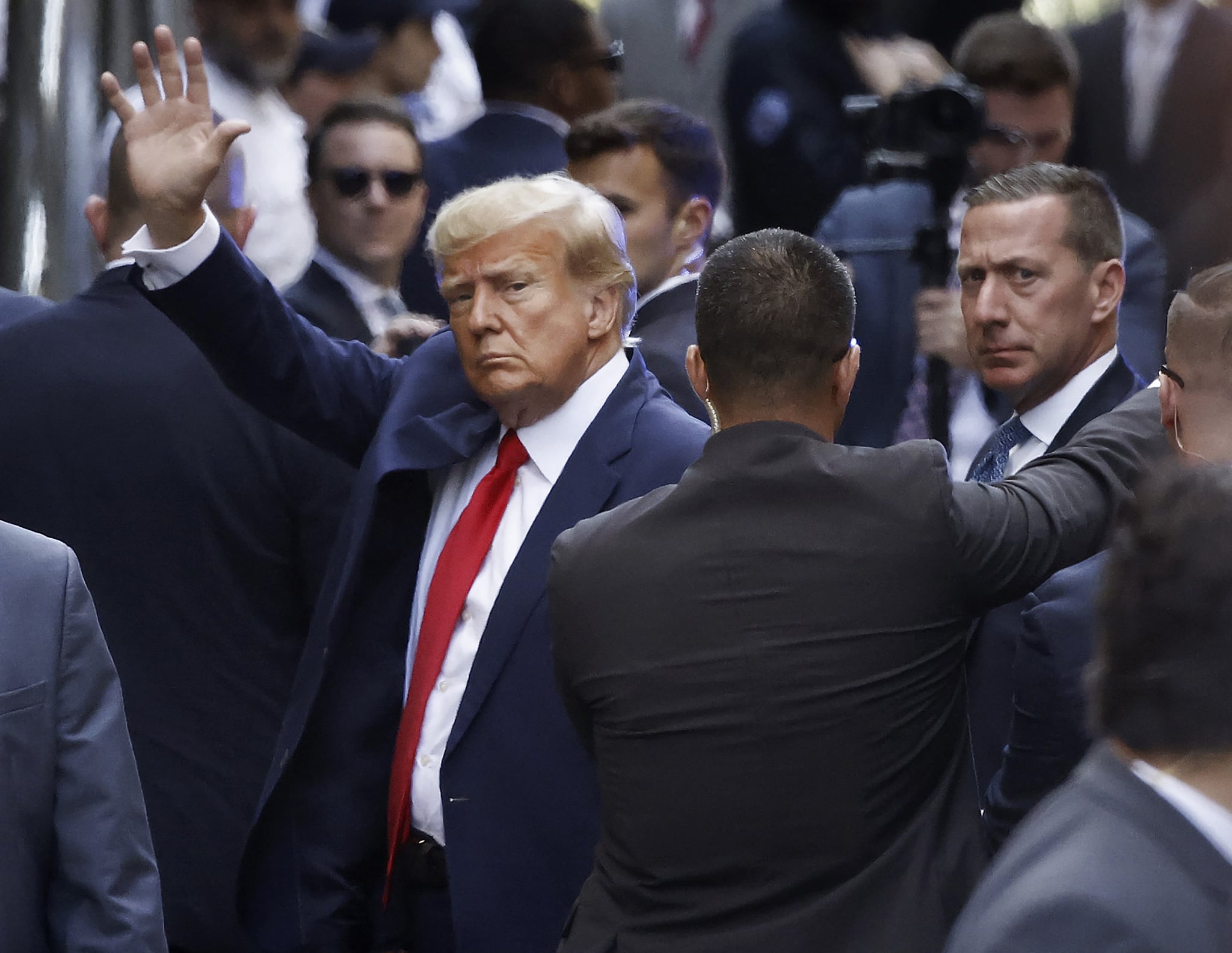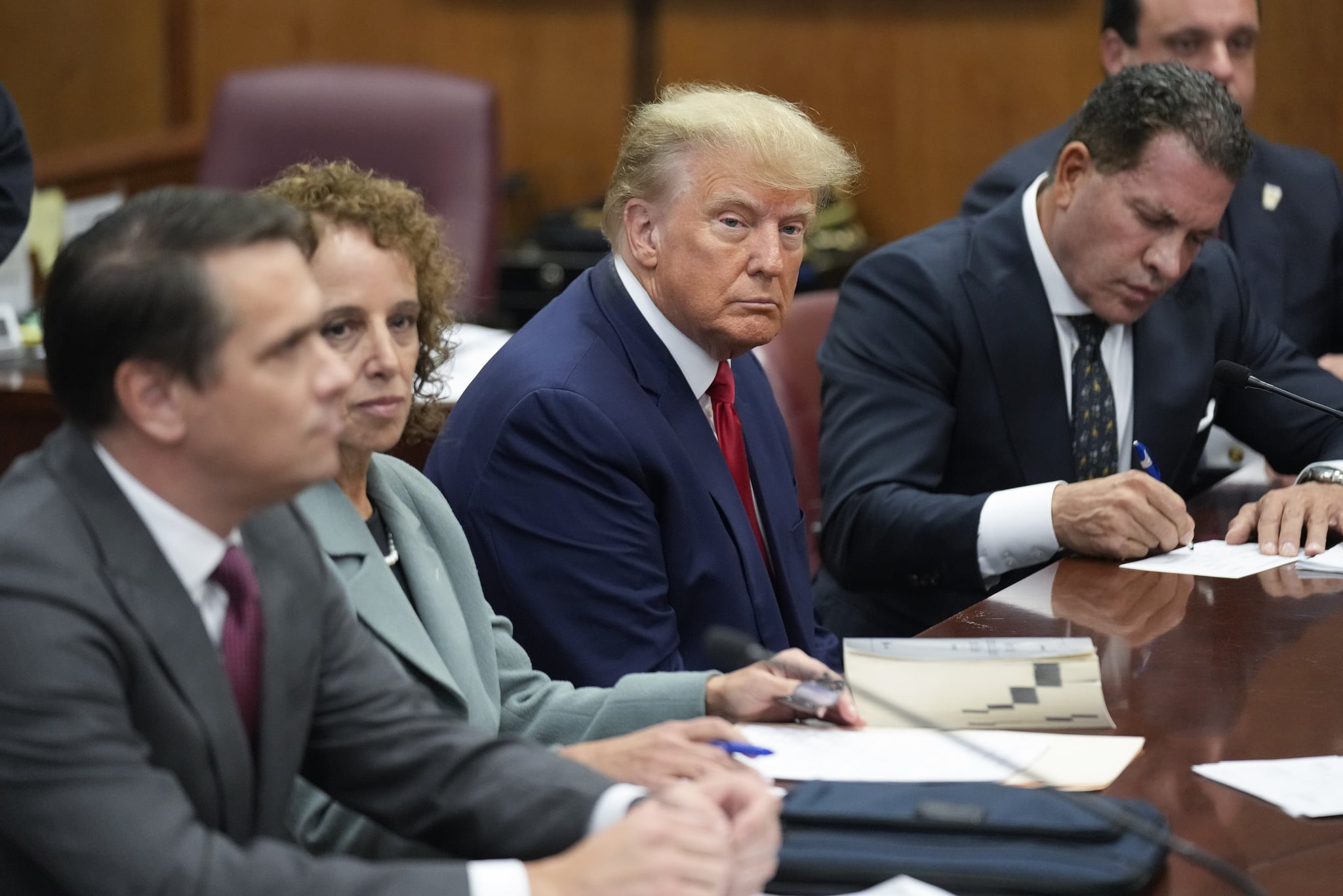
Donald Trump surrendered and appeared before a judge in a Manhattan courthouse on April 4, becoming the first former president in the nation’s history to face criminal charges. This unprecedented news comes days after a grand jury voted in favor of criminally indicting Trump over an alleged “hush money” payment to adult-film actor Stormy Daniels during the 2016 presidential campaign. Trump is facing 34 felony counts of falsifying business records.
Trump pleaded not guilty to all 34 counts, and was accompanied into the courtroom by his legal adviser Boris Epshteyn, as well as his attorneys Todd Blanche, Susan Necheles, and Joseph Tacopina. Following his appearance before the judge, Trump boarded a private jet back to Mar-a-Lago, where he addressed supporters on Tuesday night.
Trump’s arrest had been expected to follow the usual protocol, with some exceptions. His arresting officer was a DA investigator, who took the former president’s fingerprints. Trump was not be placed in handcuffs, as he is a protectee of the Secret Service. The mug shot question has been debated, and it’s likely that one was not taken, given that Trump’s face is already so widely known. Mug shots are not public record under New York state law, so even if a mug shot was taken, it will not be released unless Trump’s camp leaks it, per NPR.
Trump infamously shared the news of his own impending arrest in a post on his social media platform, Truth Social, on March 18. At the time, he claimed his arrest would take place on March 21, which did not happen. A spokesperson for Trump swiftly followed up to clarify. In a statement shared with The New York Times, the spokesperson said Trump did not have insight into the exact timing of his arrest, adding, “President Trump is rightfully highlighting his innocence and the weaponization of our injustice system.”
It is true, however, that Trump is at the center of a years-long investigation led by Manhattan District Attorney Alvin L. Bragg. Earlier in March, Trump was invited to testify before the grand jury, which was seen as a harbinger that an indictment could be imminent. The invitation from the DA’s office reportedly went unaccepted by Trump, as is often the case.
Trump’s arrest will have significant implications for the politically polarized nation, and there are concerns that demonstrations similar to the insurrection at the US Capitol on Jan. 6, 2021, could follow. It also raises many questions, given that the arrest of a former president is unprecedented. Below, we break down the most pressing questions you might have.

What are the charges Donald Trump is facing?
People of the State of New York v. Donald J. Trump includes 34 counts of falsifying business records in the first degree. Bragg’s investigation is looking into whether Trump broke New York law in connection with a payment to Daniels during his 2016 presidential campaign.
Daniels was paid $130,000 to stay silent after claiming to have had a “sexual encounter” with Trump in 2006. (Trump has denied having sex with Daniels and has repeatedly denied any wrongdoing.) In 2018, Michael Cohen, who was Trump’s personal counsel for years, pled guilty to charges related to the payment, including campaign finance violations. Cohen was sentenced to three years in prison, ultimately serving one year and spending the remainder of his sentence on house arrest.
The investigation is now probing whether Trump falsified records and disguised the hush-money payment as a legal fee to Cohen, which would be in violation of Article 175 of New York Penal Law regarding falsified business records. Cohen has claimed Trump personally told him to make the payment to Daniels.
What has Donald Trump said about his arrest?
In his post shared to his Truth Social platform on March 18, Trump said, “The far & away leading Republican candidate & former president of the United States of America will be arrested on Tuesday of next week.” He has also called the investigation a “witch hunt” and made unfounded allegations against Bragg and his office.
On the morning of his surrender, Trump posted, “The radical left democrats have criminalized the justice system. This is not what America was supposed to be!” As he was en route to the Manhattan courthouse, he again posted, “Heading to Lower Manhattan, the Courthouse. Seems so SURREAL — WOW, they are going to ARREST ME. Can’t believe this is happening in America.”
Later in the day, Trump spoke at Mar-a-Lago. “I never thought anything like this could happen in America,” he said. “The only crime that I’ve committed is to fearlessly defend our nation from those who seek to destroy it. From the beginning, the Democrats spied on my campaign. They attacked me with an onslaught of fraudulent investigations.” Trump continued on with his campaign-style speech, citing the numerous allegations against him in recent years, including claims that he colluded with Russia, and he also broached the topic of his impeachment trial.
Trump went on to repeat lies about the 2020 election and make exaggerated and unsubstantiated claims about his enemies, including the judge overseeing his case, Juan M. Merchan, and Bragg, whom he baselessly called a criminal. He used the remainder of his time at the podium to thank his family for their support and promote his run for 2024 re-election.
What happens next after Donald Trump’s arraignment?
Now that Trump has entered a not guilty plea, the prosecution will turn over to Trump’s defense team what’s known as “the discovery,” or all evidence from the investigation. From there, the defense will have 45 days to file motions to get the case dismissed, which they intend to do. The exact motions they plan to use are unknown, but could potentially involve the statute of limitations, sufficiency of the evidence, or even the location of the trial itself. Depending on how long it takes for the judge to get through all the motions filed by Trump’s lawyers, NBC predicts the case could take over a year to reach trial, assuming it doesn’t end up dismissed.
Would this bar Donald Trump from running for president in 2024?
Following his one-term presidency and subsequent loss to President Biden in 2020, Trump announced his decision late last year to run in the 2024 presidential election. Trump will still be able to participate in the race as planned, even if he is arrested and convicted. He would have only been barred from running again if he had been convicted in either one of his impeachment proceedings.
Will there be protests if Donald Trump is arrested?
Trump explicitly encouraged his followers to protest if he is arrested. “Protest, take our nation back,” he wrote on March 18. As a result, law enforcement prepared by setting up barricades outside of Manhattan Criminal Court, as well as Trump Tower.
Protesters on both political sides gathered in Manhattan on April 4. Republican Rep. Marjorie Taylor Greene of Georgia briefly appeared at a pro-Trump rally outside of the Manhattan courthouse where Trump was arraigned, but she was drowned out by the large crowd and hecklers, Rolling Stone reported, and had to be whisked away by her security.
Bragg condemned “attempts to intimidate” his office in a March 18 email to colleagues obtained by Politico. “Our law enforcement partners will ensure that any specific or credible threats against the office will be fully investigated and that the proper safeguards are in place so all 1,600 of us have a secure work environment,” the DA wrote. “As with all of our investigations, we will continue to apply the law evenly and fairly.”
Source: Read Full Article






